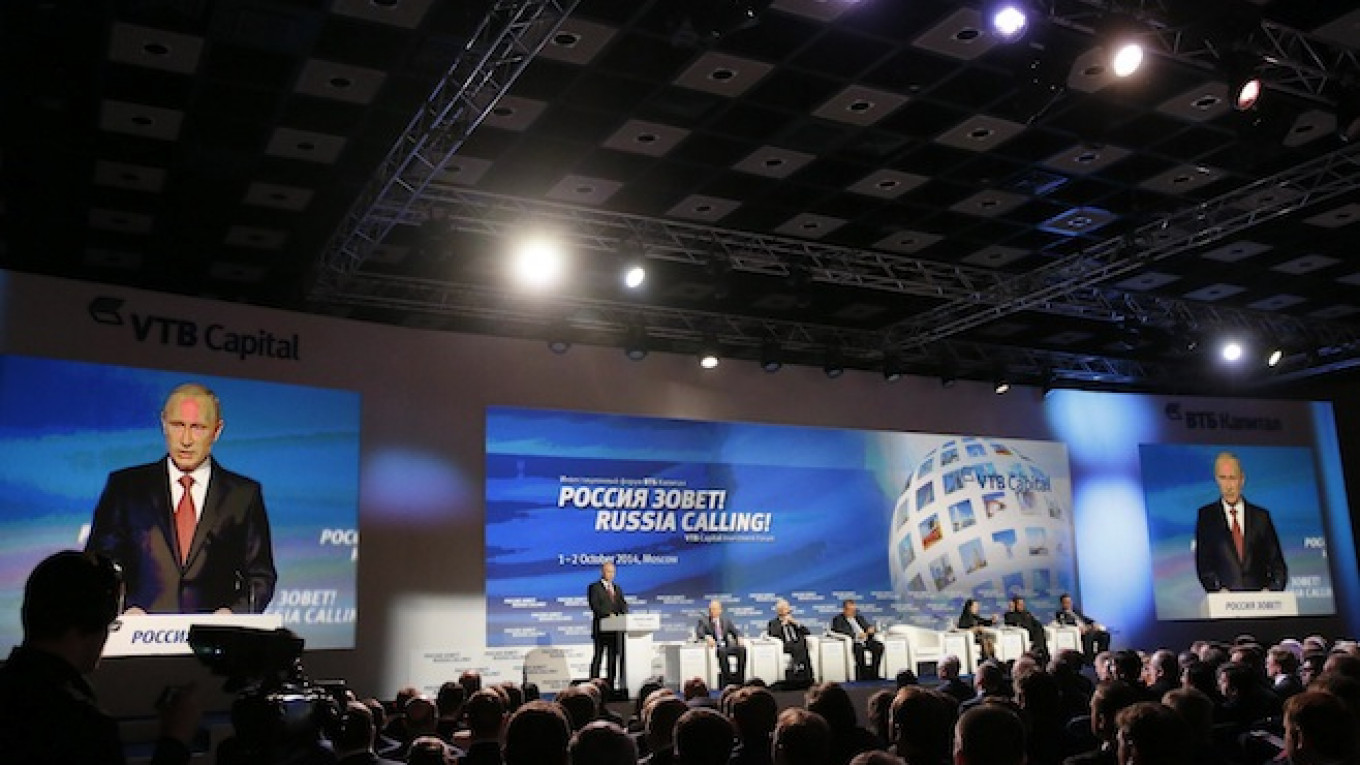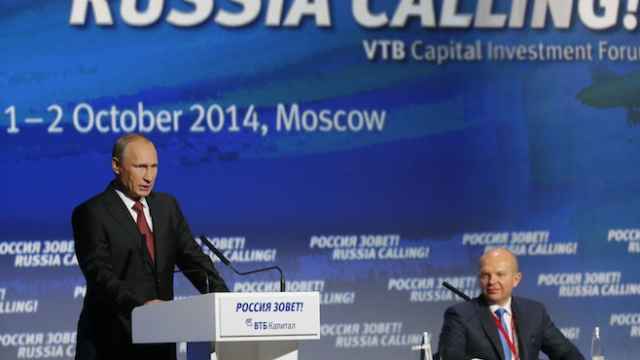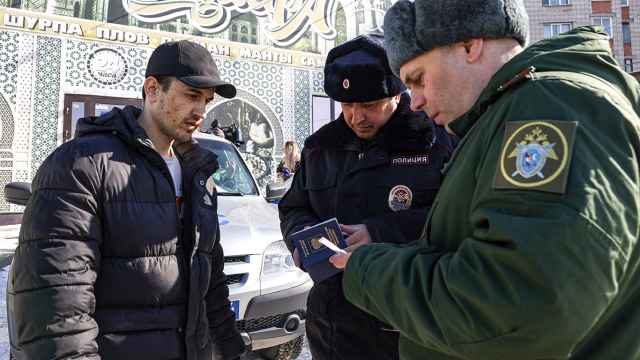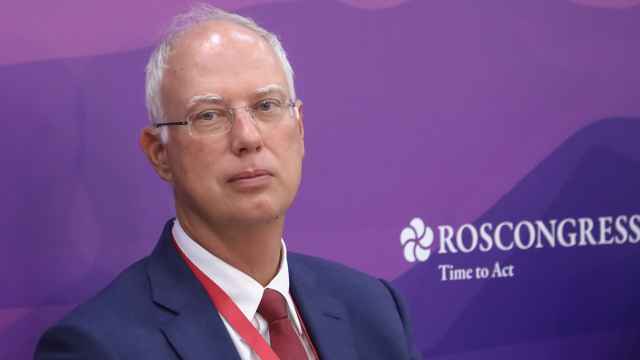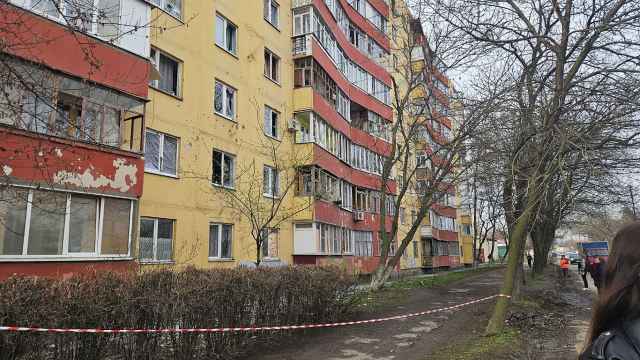President Vladimir Putin dismissed Western sanctions as "utter foolishness" on Thursday and said they would not stop Russia developing into a stronger economic power.
Attempting to take the higher ground in a speech to foreign and Russian investors, Putin said he was relaxed about the measures imposed on his country over Ukraine even though they had broken the fundamental principles of the global economy.
Addressing financiers worried about the weakening economy, capital flight and a possible increase in state intervention, he said Russia was well placed to weather the storm.
"We truly want a country that is strong, flourishing, free and open to the world," he told the VTB Russia Calling investment conference, ruling out restrictions on capital and currency movements out of Russia.
Making clear his aim was to soothe worried investors, he later began a question-and-answer session by saying with a wry smile: "All I have to do is smile to show the devil is not as frightening as he seems."
Contradicting some businessmen who fear sanctions could drive Russia into a new period of isolation, Putin underlined that he saw the country as part of the world economy, and, compared with others, a member playing by the rules.
He said sanctions violated the principles of the World Trade Organization, undermined the credibility of international financial institutions and reserve currencies, and would cause long-term damage to the entire global economy.
"It is utter foolishness from those governments, who are limiting their business, preventing it working, reducing its competitiveness, freeing up niches for competitors on as promising a market as Russia," he said.
"I would like to hope that we can get over this period of misunderstanding," he said to applause.
Calm and Relaxed
It was a calm performance by the 61-year-old president, who won popularity in his first spell as president from 2000 until 2008 by overseeing nearly a decade of economic growth.
Now some economists, including the World Bank, see Russia entering a period of near stagnation, with growth of the $2 trillion economy barely climbing above zero.
Inflation is running at an annual rate of almost 8 percent, the ruble has fallen about 17 percent against the U.S. dollar this year and the price of oil — vital to Russia's economy — has dropped below the point at which it balances its budget. Capital flight was $75 billion in the first half of the year.
Plenty of experts see more problems than Putin appears ready to acknowledge, including the absence of a clear strategy to pull the world's eighth-largest economy around.
"Right now it is clear that in this crisis situation for business there is no clear 'Plan B' from the state," said Diana Kaplinskaya, an economic analyst.
Acknowledging the "difficult times," Putin said he was sure the sanctions would spur domestic growth and reduce Russia's dependence on imports, enabling the economy to develop.
He said he was confident that a recent rise in inflation, linked to Russia's restrictions on Western food imports as a response to sanctions, would be temporary given the Central Bank's policy — which is "balanced and flexible."
Putin reiterated the importance of developing ties with Russia's partners to the east, congratulating companies which had already done deals with Chinese companies and said Russia would aim to shift to national currencies in trade.
In a message to owners of firms privatized in the 1990s, when the Soviet Union's collapse gave way to chaotic capitalism, he said there would not be a wide-scale revision of such sales.
A Moscow court's decision last month to order the seizure of the stake in oil producer Bashneft belonging to oil-to-telecoms conglomerate Sistema, and the placing of its oligarch boss under house arrest, has raised investors' fears that the Kremlin wants to reclaim prized assets.
Putin said he would not interfere in the legal case.
Asked about the conflict in Ukraine, where Russia denies sending troops and weapons to support pro-Russian separatists, he said the former Soviet republic was Russia's "closest, most brotherly nation" and hoped a parliamentary election on Oct. 26 would help bring stability to the country.
But overall, his message to those governments who imposed sanctions on Russia over its policy in Ukraine was clear — you will lose out.
A Message from The Moscow Times:
Dear readers,
We are facing unprecedented challenges. Russia's Prosecutor General's Office has designated The Moscow Times as an "undesirable" organization, criminalizing our work and putting our staff at risk of prosecution. This follows our earlier unjust labeling as a "foreign agent."
These actions are direct attempts to silence independent journalism in Russia. The authorities claim our work "discredits the decisions of the Russian leadership." We see things differently: we strive to provide accurate, unbiased reporting on Russia.
We, the journalists of The Moscow Times, refuse to be silenced. But to continue our work, we need your help.
Your support, no matter how small, makes a world of difference. If you can, please support us monthly starting from just $2. It's quick to set up, and every contribution makes a significant impact.
By supporting The Moscow Times, you're defending open, independent journalism in the face of repression. Thank you for standing with us.
Remind me later.


